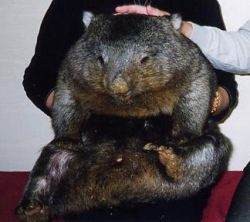Wombats, with their stout bodies and endearing faces, often evoke a sense of cuddly charm, particularly when they are young. This might lead some to wonder, could a wombat be a unique and fascinating pet? However, beneath their seemingly docile exterior lies the reality of their wild nature, posing significant challenges to anyone considering keeping them as domestic companions. The truth is, despite their initial appeal, wombats are wild animals, not domesticated pets, and their well-being is best served when they remain in their natural habitat. In many parts of Australia, keeping wombats as pets is not only unsuitable but also illegal, as they are protected native species.
The Wild Nature of Wombats: Why They Aren’t Ideal Pets
Wombats are inherently wild animals with specific needs and behaviors that are incompatible with typical pet ownership. They are powerfully built creatures adapted to life in the Australian bush, not in human homes. Their natural instincts and physical capabilities make them unsuitable for domestic environments. Laws in most Australian states and territories reflect this understanding, prohibiting the keeping of wombats as pets without specific permits, which are generally only granted to licensed wildlife carers. This legal protection underscores the recognition that wombats belong in the wild and require specialized care when orphaned or injured.
Challenges of Keeping Wombats as Pets
Attempting to keep a wombat as a pet presents numerous practical and ethical challenges.
Destructive Behavior and Strength
Wombats are incredibly strong animals with a natural instinct to dig and burrow. This powerful digging ability, essential for their survival in the wild, translates to destructive behavior in a domestic setting. They are capable of tearing through fences, damaging doors, and even compromising walls. Their strength is considerable, and containing a determined wombat can be extremely difficult, often requiring robust materials like concrete or steel to prevent them from escaping or causing damage.
Specialized Diet and Care Needs
Wombats have a very specific diet consisting primarily of native grasses, roots, and herbs. Replicating this diet in a domestic setting is complex and requires expert knowledge. Providing them with inappropriate food can lead to serious health issues. Furthermore, their care needs extend beyond just diet; they require large, secure outdoor spaces that mimic their natural habitat to express their natural behaviors, something most pet owners are unable to provide.
Aggression and Unpredictability as Adults
While young wombats may appear docile and even affectionate, this behavior often changes as they mature. Adult wombats can become increasingly aggressive, territorial, and unpredictable. Their powerful build, combined with sharp claws and teeth, makes them potentially dangerous, especially to households unfamiliar with handling wild animals. The cute, manageable juvenile wombat can quickly transform into a strong, potentially hostile adult, posing risks to owners and household members.
 Bare-nosed wombat with a person
Bare-nosed wombat with a person
Supporting Wombats the Right Way: Conservation and Care
If your interest in wombats stems from a place of care and admiration, there are far more beneficial ways to engage with these animals than attempting to keep them as pets. Orphaned or injured wombats sometimes require human intervention, and this is where trained and licensed wildlife carers play a crucial role. These dedicated individuals possess the expertise and facilities to provide necessary medical attention and raise orphaned wombats with the ultimate goal of releasing them back into their natural environment. Organizations like the Native Animal Network Association are vital in supporting these efforts and wombat conservation.
Conclusion: Wild Wombats Belong in the Wild
In conclusion, while the idea of a “Wombat Pet” might seem appealing to some, it is crucial to recognize that wombats are wild animals with complex needs that cannot be adequately met in a domestic setting. Keeping them as pets is not only often illegal but also detrimental to their well-being and potentially dangerous. Instead of seeking to domesticate these animals, a more compassionate and responsible approach is to support wombat conservation efforts and appreciate them in their natural wild habitat. For those seeking companionship, considering a virtual wombat adoption can be a fun and ethical way to support wombat welfare without compromising the animal’s well-being or your own safety and property.